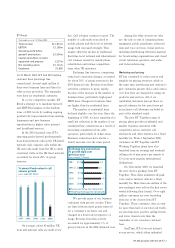BT 2001 Annual Report Download - page 21
Download and view the complete annual report
Please find page 21 of the 2001 BT annual report below. You can navigate through the pages in the report by either clicking on the pages listed below, or by using the keyword search tool below to find specific information within the annual report.
BT Annual report and Form 20-F 21
Competition
Competition Act
In addition to telecommunications
industry regulation, BT is subject to
general competition law.
The Competition Act 1998,which
came into e¡ect in March 2000, brings
the UK in line with European Community
law by prohibiting anti-competitive
agreements and concerted practices and
the abuse of a dominant market position.
In the case of telecommunications, the
Director General of Telecommunications
has concurrent investigatory and
enforcement powers with the Director
General of Fair Trading. They have
signi¢cant new investigative powers.
Breach of the relevant prohibitions could
lead to ¢nes of up to 10% of UK
turnover for each year of infringement
(up to a maximum of three years) and/or
result in claims for damages in the civil
courts. There are powers to order a
company to cease an infringing activity.
There is a new statutory
independent appeals mechanism for
decisions under the Competition Act.
The competitive environment
The UK telecommunications market is
fully open to entry and highly
competitive. As a result, the UK
Government (HM Government) and Oftel
have indicated their expectation that it
will be appropriate to move away from
sector-speci¢c (including licence-based)
regulation to greater reliance on the
Competition Act.
However, as described above, Oftel
currently regulates BT mainly through
the provisions in the Licence. BT has
commenced discussions with Oftel on
amendments that BT believes should be
made to the Licence to take account of
the introduction of the Competition Act.
Although it is some years since the
Telecommunications Act abolished the
company’s monopoly in
telecommunications, obligations placed
on BT are generally more onerous than
for other licensees. BT believes the
separation of the wholesale and retail
businesses should mean that the retail
business will be regulated in a similar
manner to other equivalent businesses.
Pricing regulation
Fixed network
BT is subject to price controls on its
¢xed-network services in the UK at two
levels: retail and network. Competitors
are generally not subject to price
controls.
Retail price controls
BT is subject to two sets of UK retail
price controls, one on certain public-
switched telephony call charges and
exchange line rentals, and one on certain
private circuits. Each price control is
based on a formula calculated by
reference to the UK Retail Prices Index
(RPI) and an e⁄ciency factor, X.
For services covered by the controls,
weighted average prices cannot increase
in each year beginning 1 August by more
than the annual change in RPI minus X.
In times of low in£ation, the overall
e¡ect of this control requires the
company to reduce its prices.
The retail price control for public-
switched telephony, applying from
August 1997 to July 2001, is RPI minus
4.5. Although it is measured on services
used by the lowest 80% of BT’s
residential customers classi¢ed by bill
size, controlled prices must be o¡ered to
all customers. The price control formula
and the company’s performance against
theformulaaresetoutinthetablebelow.
BT has also given an assurance that
a ‘‘control’’ price package will be made
available to business customers. The
control package for small business
customers provides that call charges will
be no higher than the prices used for
calculating adherence to the residential
price control, and line rental increases
will be no more than the change in RPI.
Under the price controls for private
circuits, applying from August 1997 to
July 2001, prices for domestic analogue
and low-speed digital private circuits
cannot be increased by more than the
change in the RPI in any year. Each
discrete international private circuit price
is subject to a safeguard cap of RPI.
Network charge control
The company operates under
interconnection agreements with most
other licensed operators.
A network charge control regime,
operating until 30 September 2001, gives
BT the freedom to set reasonable charges
based on long-run incremental costs for
Years commencing 1 August 1995 1996 1997 1998 1999 2000
Price control formula (RPI-X)
% RPI movement for the relevant period (a) 3.52 2.14 2.94 3.75 1.35 3.32
X in price control formula (b) 7.50 7.50 4.50 4.50 4.50 4.50
% required reduction in prices (c) (1.38) (4.92) (1.56) (0.73) (3.15) (1.09)
% reduction in prices overall (1.82) (4.92) (1.56) (0.73) (3.24) (1.20)(d)
(a) Annual increase in RPI to previous June
(b) From 1 August 1997, the RPI formula covers the main switched telephone services provided to the lowest 80% of BT’s residential customers by bill size
(c) After permitted carry forward of any unused allowance or shortfall from previous years
(d) Price changes implemented up to 22 May 2001
























